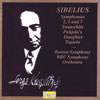Koussevitsky conducts Sibelius
View record and artist detailsRecord and Artist Details
Composer or Director: Jean Sibelius
Genre:
Orchestral
Label: Pearl
Magazine Review Date: 7/1990
Media Format: CD or Download
Media Runtime: 125
Mastering:
Mono
ADD
Catalogue Number: GEMMCDS9408

Tracks:
| Composition | Artist Credit |
|---|---|
| Symphony No. 2 |
Jean Sibelius, Composer
Boston Symphony Orchestra Jean Sibelius, Composer Serge Koussevitzky, Conductor |
| Swanwhite, Movement: The Maiden with the Roses |
Jean Sibelius, Composer
Boston Symphony Orchestra Jean Sibelius, Composer Serge Koussevitzky, Conductor |
| Tapiola |
Jean Sibelius, Composer
Boston Symphony Orchestra Jean Sibelius, Composer Serge Koussevitzky, Conductor |
| Symphony No. 5 |
Jean Sibelius, Composer
Boston Symphony Orchestra Jean Sibelius, Composer Serge Koussevitzky, Conductor |
| Symphony No. 7 |
Jean Sibelius, Composer
BBC Symphony Orchestra Jean Sibelius, Composer Serge Koussevitzky, Conductor |
| Pohjola's Daughter |
Jean Sibelius, Composer
Boston Symphony Orchestra Jean Sibelius, Composer Serge Koussevitzky, Conductor |
Author: Robert Layton
Among the great conductors closely identified in the public mind with Sibelius (Kajanus, Bee cham and Karajan), Koussevitzky is the one whose star has faded. Not, I hasten to add, among serious collectors, but as far as the wider musical public is concerned. While Toscanini and Furtwangler have a powerful head of steam behind them, and many partisan supporters, Koussevitzky enjoys scant representation in the catalogue. But if neither he nor Weingartner have acquired cult status, their claims on our allegiance are every bit as strong.
In the 1930s and 1940s, Koussevitzky's repu tation as a great Sibelius conductor was second to none: less well known is the fact that he was a relatively late convert to his cause not until the mid 1920s was his enthusiasm really fired. In 1926, two years after he had come to Boston, he presented the Seventh Symphony, and his celebrated recording was made seven years later during his guest appearances with the then newly-formed BBC Symphony Orchestra. To my mind it remains the most electrifying performance ever committed to disc, an account of extraordinary intensity and concentration. I have it on 78rpm discs and LP but the new transfer gives it a body and presence that are exhilarating.
Koussevitzky recorded the Second Symphony in Boston two years later, in 1935, and then again in 1950. This latter performance was available as an LP on RCA until quite recently. The present version of the work was the second to appear—Kajanus's pioneering account had been made in 1930 for Columbia. Koussevitzky's, however, is very different: the opening allegretto is far more measured and has the greater breadth, though I suspect that Kajanus was closer to Sibehus's intentions. Of course, the orchestral playing of the Boston Symphony is vastly superior, partlcularly the strings, which positively glow. The anonymous 1930 London orchestra (it was in fact the LSO) was at that time no match for 'the aristocrat of orchestras'. Throughout this Boston perforrnance there is a sustained feeling for line, a tenuto of remarkable quality and a sense of direction and power that are altogether exceptional.
Koussevitzky's accounts ofPohjola's daughter and the Fifth Symphony appeared on LP in 1970 (RCA—nla). The former has been surpassed in dramatic fire only by Toscanini and the latter has the same wonderful sense of line Koussevitzky achieved in the Symphonies Nos. 2 and 7. As far as I know, Tapiola has never appeared in this country in any other than its 78rpm format and the excellence of the transfer heightens its impact. If you possess and cherish the originals, you will need no encouragement from me to get the CD version. As I have said elsewhere, ''among the pantheon of great performances on record this wonderfully concentrated and thrilling account must rank high'' and such is its intensity that, after hearing it again, I wondered whether it had ever been surpassed even by Beecham and Karajan. In Koussevitzky's hands the forests seem to howl in some kind of primaeval agony. His performance of ''The Maidens with roses'' from Swanwhite has also remained out of currency since the 1930s (it was issued on the last side of the Fifth Symphony) and was well known at one time, thanks to this seductive performance.
Here is a marvellous set, excellently transferred. Let us hope we don't have to wait for the copyright to expire in the mid 1990s for Koussevitzky's pioneering and incandescent 1940s version of Harold in Italy to reappear!'
In the 1930s and 1940s, Koussevitzky's repu tation as a great Sibelius conductor was second to none: less well known is the fact that he was a relatively late convert to his cause not until the mid 1920s was his enthusiasm really fired. In 1926, two years after he had come to Boston, he presented the Seventh Symphony, and his celebrated recording was made seven years later during his guest appearances with the then newly-formed BBC Symphony Orchestra. To my mind it remains the most electrifying performance ever committed to disc, an account of extraordinary intensity and concentration. I have it on 78rpm discs and LP but the new transfer gives it a body and presence that are exhilarating.
Koussevitzky's accounts of
Here is a marvellous set, excellently transferred. Let us hope we don't have to wait for the copyright to expire in the mid 1990s for Koussevitzky's pioneering and incandescent 1940s version of Harold in Italy to reappear!'
Discover the world's largest classical music catalogue with Presto Music.

Gramophone Digital Club
- Digital Edition
- Digital Archive
- Reviews Database
- Full website access
From £8.75 / month
Subscribe
Gramophone Full Club
- Print Edition
- Digital Edition
- Digital Archive
- Reviews Database
- Full website access
From £11.00 / month
Subscribe
If you are a library, university or other organisation that would be interested in an institutional subscription to Gramophone please click here for further information.




